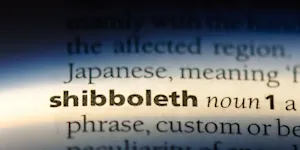What Makes This Word Tick
"Kowtow" is a fascinating word with roots that dig deep into cultural norms and traditions. It expresses the act of deep respect or submission, often involving a physical gesture of bowing or kneeling. In modern vernacular, it's taken on a bit of a critical tone, often used to indicate someone excessively or unnecessarily obeying.
If Kowtow Were a Person…
Imagine Kowtow as a dignified elder, perhaps from a bygone era, deeply respected and slightly traditional. Always courteous, sometimes to a fault, they'd be the type to meticulously observe all social niceties, never forgetting to send a thank-you card or to hold the door open for others.
How This Word Has Changed Over Time
Originally, "kowtow" described a formal act of deep respect, where one would kneel and touch their forehead to the ground. Now, the word has shifted slightly in English to suggest not just respect, but often an overly submissive act, sometimes with a hint of disapproval.
Old Sayings and Proverbs That Use Kowtow
Proverbs directly mentioning "kowtow" are rare, but the sentiment echoes in sayings like "bending over backward" or "bowing and scraping," depicting excessive subservience or eagerness to please.
Surprising Facts About Kowtow
Did you know the original "kowtow" is a significant ritual in Confucianism? It was used in court ceremonies in Imperial China, a powerful symbol of hierarchy and respect. Today, "kowtow" in English often carries a more metaphorical and sometimes negative connotation.
Out and About With This Word
You'll find "kowtow" frequently in political commentary, where leaders are accused of "kowtowing" to powerful interest groups. It’s in these discussions that the word reveals its modern edge, often hinting at a lack of backbone or excessive compliance.
Pop Culture Moments Where Kowtow Was Used
While not as common in blockbuster scripts, "kowtow" effectively underscores underdog stories where a character refuses to yield to powerful forces. It often pops up in critical reviews or dialogues about power dynamics in stories.
The Word in Literature
"Kowtow" finds its natural home in historical fiction set amid royal courts, where intricate rituals ruled daily life. Imagine Jane Austen's characters, swathed in propriety, would they have frowned upon or indulged in a good kowtow now and then?
Moments in History with Kowtow
In the 18th century, Lord Macartney famously refused to kowtow to the Qianlong Emperor during Britain's trade negotiation attempt. This historical incident perfectly encapsulates the word in its authentic sense and the cultural clash it can sometimes symbolize.
This Word Around the World
In Mandarin, "kòu tóu" still holds its original meaning, deeply rooted in respect. In Japanese, the equivalent gesture would be "dogeza," capturing a similar essence of humility and deference, yet "kowtow" in English now leans toward critique rather than respect.
Where Does It Come From?
"Kowtow" originated from the Chinese "kòu tóu," which directly translates to "knock head," a fitting description of the gesture it traditionally denotes. It entered the English lexicon in the early 19th century with the rise of diplomatic interactions with China.
How People Misuse This Word
Often misused to simply mean "agree," "kowtow" carries themes of excessiveness and obligation. It’s not merely an agreement but one made with deference, often under duress or pressure from authority.
Words It’s Often Confused With
Submit: Lacks the physical or hierarchical connotations that kowtow implies.
Obey: More straightforward, without the implicit nuance of excessive behavior tied to kowtow.
Bow: A broader term, encompassing a wide range of gestures without the cultural weight or depth of respect as in kowtow.
Additional Synonyms and Antonyms
Synonyms for "kowtow" include "grovel," "prostrate," and "bow down to." Its antonyms are "defy," "resist," and "stand up to."
Want to Try It Out in a Sentence?
"Despite the pressure, she refused to kowtow to the corporate giants, showing a remarkable spine and sense of purpose."
















